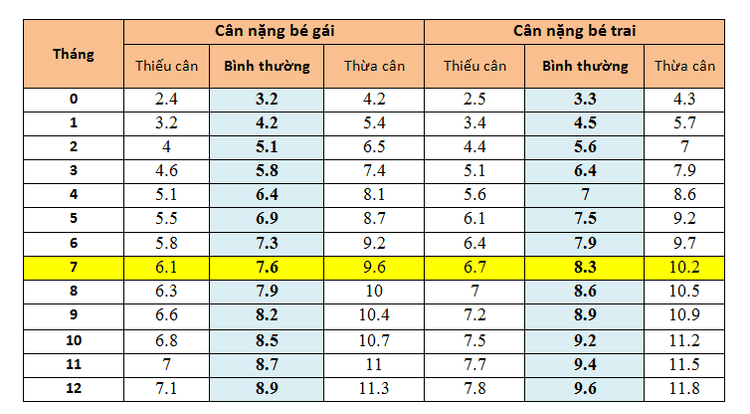This is an automatically translated article.
Post was professionally consulted with Level II Specialist Doctor Trinh Minh Chau with 21 years of experience in Pediatrics in Ho Chi Minh City, especially respiratory diseases. Dr. Chau currently has a working schedule at Tran Cao Van Clinic on Thursday mornings and at Vinmec Central Park Hospital on Saturday mornings (weekly).Newborns grow fastest in height and weight in the first 6 months of life. Entering the 7th month, the weight and height indicators will increase more slowly than in the previous stages.
1. How much does a 7 month old baby weigh?
You can measure your child's weight and height with very simple tools such as scales and rulers. For children under 24 months old, measure the lying length and from 24 months old, measure the standing height.Below is a standard weight and height chart for babies in the first year of life. There will be many factors that make a child's weight slightly different, so mothers should not be too worried if the child's weight has not exceeded the allowable threshold.

Based on the weight and height data table of the World Health Organization, the weight and height of a 7-month-old baby will meet the standards at:
For boys, the weight will reach: 8.3 kg and height reached 69.2. For girls, the weight is 7.6 kg and the height is 67.3.
Trắc nghiệm: các chỉ số cần chú ý về sự phát triển thể chất của trẻ
Chiều cao, cân nặng của bé ở từng giai đoạn nên là bao nhiêu là bình thường, bao nhiêu là bất thường? Cùng ThS.BS Ma Văn Thấm điểm lại xem bạn đã nắm được các chỉ số phát triển thể chất của bé chưa nhé!The following content is prepared under supervision of Thạc sĩ, Bác sĩ y khoa, Ma Văn Thấm , Nhi , Phòng khám Đa khoa Quốc tế Vinmec Dương Đông(Phú Quốc)
2. Height of 7 month old baby
Currently, many mothers are only interested in the weight growth, but have not paid attention to the height growth of their children.The average length of a newborn is about 50cm, the first 3 months the baby grows from 3-4.5cm/month, the next 3 months increase from 2-2.5cm/month, the next 3 months increase 2cm/month, the next 3 months Next increase from 1-1.5cm. When a baby is 1 year old, it is 1.5 times longer than at birth (75cm). Thus, when about 7 months old, the average boy will reach about 69.2 cm, the girl will be about 67.3 cm.
Parents should regularly monitor the child's weight and height. In case the child is overweight or underweight, is outside the permissible threshold, or even has not gained weight for 3 consecutive months, parents may need the support of a nutritionist for children to find out. take corrective action, or identify a problem, if any.
3. Factors affecting children's height - weight
A number of factors will cause a child's weight to be lower, or higher, than average. Understanding the factors that affect the development of children's physical health will help parents have a better parenting orientation not only during this very important first year of life.Genetic factors The child born will inherit all the genetic characteristics of both parents, including height and weight. However, genetics is not everything. Some studies suggest that a child's height is usually only 23% affected by genetic factors.
Nutrition and living environment

For 7-month-old children, breast milk is still the main source of energy for children to develop well, at this stage, eating for children is still just learning to eat and learn about eating.
The mother still maintains breastfeeding about 600-700ml/day and alternates feeding with 2 solid meals. Baby can eat monosodium glutamate, then switch to eat more salty powder. In addition, mothers can process salty flour and add pork, fish, ... to the menu for children to eat solids to supplement nutrients.
Besides nutrition, other environmental factors such as climate, environmental pollution can also be the risk of slowing down the physical development process in children.
Chronic diseases If a child is unfortunately born prematurely, has congenital or chronic medical conditions, the weight and height of the child can be greatly affected, often in a negative way.
According to a study published in the popular American medical journal the Journal of the National Medical Association in January 2000, children with a history of serious medical conditions such as sickle cell anemia From 8 to 19 years old, they are often short and weigh much less than healthy children. At the same time, the physiological development or reproductive health of children during puberty and adolescence is also disrupted and delayed.
Care and closeness of parents Research at the National Institute of Child Health and Human Development (USA) shows that the care of parents and non-blood relatives (who keep the same bloodline) child) is a major factor in the physical and mental, behavioral, and emotional development of a child from birth to puberty.
Maternal health during pregnancy and lactation Maternal health during pregnancy is directly related to the health and development of the fetus. If pregnant mothers are often stressed, or sick, poor nutrition can slow down the development of the baby.
For mothers who are breastfeeding, during this period, breast milk is still the main meal of the baby. Mothers must supplement with adequate nutrients for adequate milk supply, many nutrients to help children develop comprehensively.
7-month-old babies need 5mg of elemental zinc/day to eat well, reach the correct height and weight and exceed the standard. Zinc plays a role in affecting most biological processes taking place in the body, especially the breakdown of nucleic acids, proteins... Organs in the body when zinc deficiency can lead to a There are a number of diseases such as neurological disorders, irritability, etc. Therefore, parents need to learn about the role of zinc and guide them to appropriate zinc supplements for their children.
In addition to zinc, parents also need to supplement their children with other important vitamins and minerals such as lysine, chromium, B vitamins,... errands.
Please regularly visit Vinmec.com website and update useful information to take care of your baby and family.














